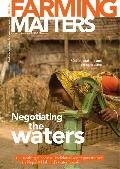Local resources / From the Brazilian GMO campaign / Payment for Environmental Services (1) / Payment for Environmental Services (2) / More to read
Farming Matters welcomes comments, ideas and suggestions from its readers. Please send us an e-mail to ileia@ileia.org or write to P.O. Box 2067, 3800 CB Amersfoort, the Netherlands.
Local resources
Greetings from Flores, Indonesia. Your most recent volume was particularly interesting, so I’d like to share what we do with many farmer groups in our area. We prefer to mobilise local resources. We have set up Saving Loan Units (or UBSPs, Usaha Bersama Simpan Pinjam), and they all run on their own funds. We merely provide trainings, follow up visits and advice. And gradually their savings become bigger! To give the UBSPs money from outside would be just like “pouring a lot of water into a small half-full glass”: it can damage the glass itself. Very often we see that problems arise not only when there is no money; but often when there is too much money, but no good plan for using it wisely.
Tarsis Hurmali, Ayo Indonesia Foundation, Flores Organization for Rural Development, Flores, NTT, Indonesia
From the Brazilian GMO campaign
Your latest issue of Farming Matters described the efforts that AS-PTA and other partners at the GM Free Brazil Campaign are engaged in in order to stop the dissemination of GM crops. Readers may be interested to know that a court ruling now prohibits Bayer from marketing Liberty Link maize – which is resistant to the herbicide glufosinate – anywhere in the country. The federal judge Pepita Durski Tramontini from the Curitiba Environment Court also specifically revoked authorisation for the crop’s release in the north and northeast of Brazil due to the absence of any studies to show the potential impacts of this technology on the regional biomes. The ruling sets a R$ 50,000 per day fine for Bayer should the company fail to suspend the marketing, sowing, transportation, import and even disposal of Liberty Link maize with immediate effect. The court has also ordered the National Biosafety Committee to make companies’ applications publicly available. You can read more here: http://www. aspta.org.br/por-um-brasil-livre-detransgenicos/ updates
Gabriel B. Fernandes, AS-PTA, Brazil, via e-mail
Payment for Environmental Services (1)
This proposal is really a good way to improve or conserve biodiversity in developed countries, or in countries where the government and people are not corrupt. But in most developing countries, where there are very few efforts to conserve biodiversity and the environment, the governments are usually corrupt. This can be a serious problem as the PES approach is hardly possible without government involvement.
Edison Purba, University of Sumatera Utara, Medan, Indonesia, on our Open Forum
Payment for Environmental Services (2)
I’m not sure I understand why farmers in developing countries should be compelled to enter into these arrangements, which basically just seem like a way to make them clean up the mistakes of the industrial world. My questions would be, who makes the rules for what they do with their land? What kinds of stipulations are there? Why are they being made to fit into some scheme developed by the west? Honestly, I just see the potential here for more imperialist development schemes, and more exploitation (eco-friendly exploitation…ecoploitation?), whereby farmers lose their sovereignty (or any sovereignty that they have left). Who decides what has value? I really just see these payments for services arrangements as another way to control people, and to perpetuate a Euro-centric notion of what both the problems and solutions are.
S. White, on our Open Forum
More to read
Thanks for a nice “Money for farming” issue. As your magazine points out, value chain finance is a good way of increasing access to finance and reducing risks and costs. For those interested, a new book is now available from the Food and Agriculture Organization of the UN (FAO) and Practical Action Publishers. “Agricultural value chain finance” reviews many different experiences, and presents lessons drawn from several countries.
Calvin Miller, Group Leader of the Agribusiness and Finance Group, FAO, on our blog

